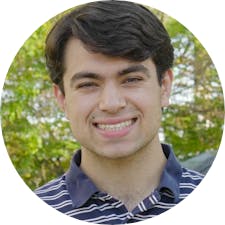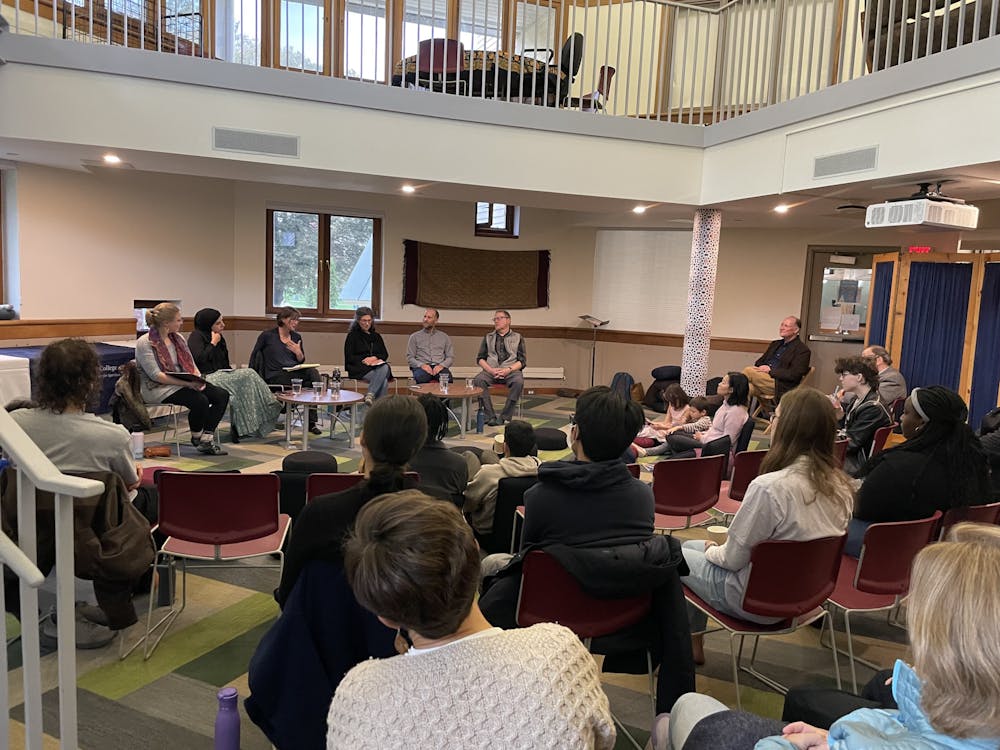A recent panel and structured dialogue session have given the Middlebury community the opportunity to address the war in Israel and Gaza.
As the first in a series of interfaith discussions, an Oct. 25 panel on compassion, justice and nonviolence sought to bring a diverse array of religious perspectives to the campus conversation about the conflict in the region.
Put on by the Davis Collaborative in Conflict Transformation and the New Perennials project, the event featured chaplains and religious advisors from the Charles P. Scott Center for Religious Life. They gathered in the McCullough Student Center to discuss these themes as informed by their respective religious backgrounds and worldviews.
Members of the panel included Muslim Chaplain and interfaith advisor Zahra Moeini, Rabbi Danielle Stillman, interim Christian Affiliate Chaplain Katie Runde Sanchez, Affiliate Humanist Chaplain and scholar-in-residence Bill Vitek and Associate Laboratory Professor Marc Lapin from the Environmental Studies department. The panel was moderated by Associate Professor of Environmental Studies Rebecca Gould, who was formerly a part of the Religion department at Middlebury.
In an interview with The Campus, Stillman described the panel’s motivations and the role of the Scott Center in light of the recent violence in Israel and Gaza.
“We decided to use this time to explore religious perspectives on these different topics and relate them to what is going on in Israel and Gaza,” Stillman said. “It was a bigger idea about where different religious traditions come into conversation around these ideas.”
Stillman explained that the panel sought to offer an alternative model of discussion about contemporary violence by providing an empathetic and responsive space for sharing and discussing as opposed to the rigid structure of academic, fact-based debate. The mission of the Scott Center, and of religious dialogue more broadly, is threatened by the practice of examining all discourse through a political lens and always assigning political consequence to what is said or discussed, she added.
“I almost see our role like medics in war, and we’re treating everybody on campus regardless of where they fall on this issue,” she added. “I just want us to be able to continue doing that.”
Moeini echoed Stillman’s sentiments about the panel, emphasizing the importance of justice for those facing structural inequalities and tragedies.
Drawing on the teachings of her Muslim faith and her experience as a religious advisor, Moeini sought to provide a validation of all human life through the panel, regardless of background, religious orientation or relationship to the violence in the Middle East.
“I am deeply grateful for our panel,” Moeni wrote in an email to The Campus. “It was a much needed and powerful presence in these chaotic times — our panelists’ diverse voices rechanneled a global grief into a call for action, unity, and re-humanization.”
Moeini added that moving forward, she hopes the Middlebury community will continue to engage with moral issues in a productive and diligent fashion, and will be proactive in combating discriminatory or marginalizing behavior.
“We thankfully have statements as well as resources that highlight antisemitic bigotry on campus,” she wrote. “We must also formally recognize and condemn Islamophobic and anti-Palestinian bias and bigotry that threatens doubly marginalized groups like Muslims and/or Palestinians through formal statements and educational workshops. I hope we collectively and urgently take [the] lead on these initiatives.”
The Kathryn Wasserman Davis Collaborative in Conflict Transformation, one of the co-sponsors of the panel, is an initiative working across the college, the Middlebury Institute, Bread Loaf and the schools abroad to rethink and re-design how we engage with conflict.
“Conflict transformation begins with the recognition that destructive conflicts can ruin relationships and destroy communities,” Sarah Stroup, associate professor of political science and executive director of the collaborative told The Campus. “Conflict transformation focuses on trying to build our knowledge, skills and capacities so that we can move from more destructive dynamics into more constructive dynamics in conflict situations.”
Stroup believes that in light of the war in Israel and Palestine, the collaborative plays an essential in ensuring that Middlebury addresses the violence with compassion and respect. She added that conflict transformation is not an immediate, snap-of-the-fingers fix, but rather an invitation to seek methods of changing conflict from a destructive interaction to a constructive experience.
“Like what we are witnessing in Israel and Gaza, the ones suffering the most in global conflicts are the ones with the least amounts of power,” Stroup said. “The first thing to do is to respond with compassion, and to meet people where they are.”
The collaborative is reaching out to support Middlebury students, families and community members endangered by the conflict, and hopes to provide not only a resource with tools to modify conflict, but an environment devoted to ensuring the safety of all who are affected by the violence, Stroup said.
For Sebnem Gumuscu, associate professor of political science and head of Conflict Transformation in undergraduate life, the Israel-Palestine conflict is an important professional and academic area of focus. Gumuscu teaches four political science courses on the topic — Contemporary Conflicts in the Middle East, International Politics of the Middle East, Politics of the Middle East and North Africa and Israel-Palestine Conflict.
In addressing the conflict through an academic lens, Gumuscu said she and her colleagues provide the factual complement to the space for vulnerability, expression and healing that chaplains at the Scott Center offer.
“We need affinity groups and academic spaces, and we need support groups that we receive and enter into as community members,” she said. “This is not just one-size-fits-all, and it cannot work like that.”
Conversation informed by conflict transformation principles can bridge the gap in the battle between contested facts and emotional responses, Gumuscu said. “Dialogue is not an affinity space, and neither is it an academic space. It is somewhere in-between, and you can trust that no one will judge you in that space,” she explained. “But you must keep in mind that that space is for sharing, not persuasion.”
Looking forward, Gumuscu said she hopes to continue addressing the conflict both in her classroom and in structured extracurricular spaces. “We can have these difficult conversations, not only about Israel and Palestine, but about other parts of the world, and that requires skills and knowledge that we build together,” she said.
The conflict transformation collaborative hosted a structured dialogue session over dinner this past Monday, Oct. 30 in the Mahaney Arts Center (MAC) to facilitate discussion about the war in Israel and Gaza.
Stroup and Khuram Hussain, associate professor of education and vice president of equity and inclusion, provided opening remarks to the dialogue, sharing their confidence in the event's ability to generate productive conversations.
The dinner’s 45 attendees, which included students, staff and faculty, were divided into small groups of five to six participants to engage in structured dialogue for about an hour. The conversations were moderated by Middlebury faculty and staff trained in Conflict Transformation methodology, including restorative practices and the principles of structure dialogue.
Before the structured dialogues formally began, participants were asked to reflect upon their personal experiences and relationships to the conflict, as well as their concerns about engaging in a conversation like this about a controversial subject. For each of the three main conversational prompts in the dialogue, participants were given time to silently gather their thoughts and write notes before each person was allowed two minutes to respond in their small group. As the event went on, the rules and time requirements of the conversations became more elastic, giving participants the chance to guide the conversation and respond in real time to comments and questions raised by peers. Each group was allowed to end their conversation on their own time, when the members felt they had arrived at a natural stopping point.
“It went relatively well,” said Griffin Fill ’23.5, one participant in the dialogue. “It was very meta — so meta that at some points I don’t think we were talking about much of anything, but it is an exceedingly difficult topic.”

Cole Chaudhari '26 (he/him) is the Senior News Editor.
Cole has previously served as a Managing Editor, News Editor, Copy Editor, and Staff Writer. He is majoring in History and English Literature, and spends his time outside of the newsroom reading about sound reproduction technologies and making field recordings. This past summer, he taught high schoolers at a summer program at a boarding school in New Hampshire.




